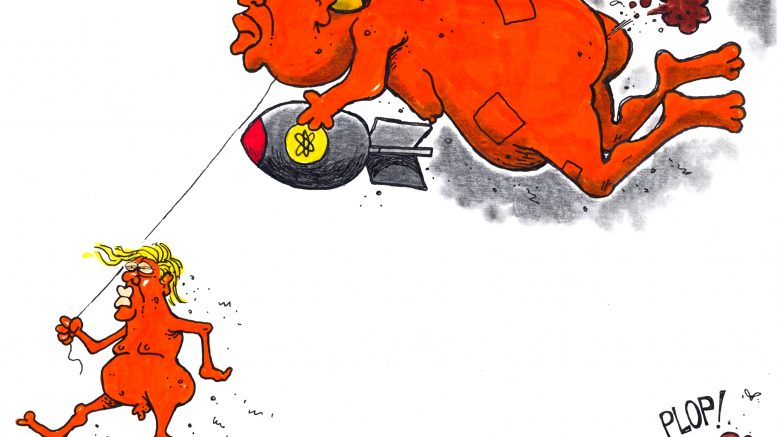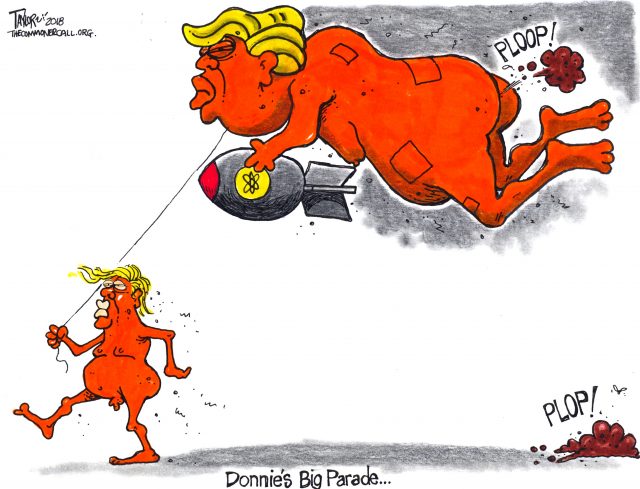“The “moment” Trump seems to be striving for cannot arrive and serve his purposes unless he builds toward it with his speech. He is creating conditions now to support further action later…”
By Bob Bauer
Lawfare (2/9/18)
We are constantly confronted with the question of how seriously to take the president’s words. By one interpretation, not so much: His verbal excesses and outrages should not be confused with action. This is the variant of the old counsel “watch what we do, not what we say.” President Trump said he would revisit the libel laws but didn’t; he did not file the threatened lawsuit to stop publication of “Fire and Fury.” He has attacked the courts, but his administration has complied with their orders. In a sober-minded warning against overreaction, Eric Posner suggests that observers take care to distinguish “bark” from “bite.” Likewise, in their recently published book, “How Democracies Die,” Steven Levitsky and Daniel Ziblatt warn strongly about the dangers of Donald Trump’s style of leadership but also fall back on the distinction between words and actions, and between impulse and deed, in concluding that he has not yet “crossed the line” into authoritarianism.
These and other commentators agree that the president’s words could be intended to prepare the way for bad actions to follow. He weakens norms and undermines institutions and, over time, he may take action made by possible by the damage he caused with his words. But until then, he has only barked, and the occasion to respond will arise only when he has bitten. This is the basis for Ross Douthat’s insistence that Trump, as demagogue, has been “contained” by a Republican Party—at least in the Senate—unwilling to help execute on his demagogic claims. Worries about the president’s words, Douthat writes, are “based on things that haven’t happened yet.”
This word/action distinction holds up to a point, but it is overstated and may serve to confuse rather clarify the deep problems with the Trump presidency. Recent events have brought a key example: The New York Times reports that the president’s lawyers are advising him to decline an interview with the special counsel, while Trump keeps up his attacks on the Russia “hoax” and “witch hunt.” The president’s words on this subject have accumulated a force that transcends mere bluster; they constitute the first of a series of actions potentially leading to the denial of a president’s testimony in a major law-enforcement investigation. Separating word from action in this context is difficult—in part because what Trump is saying and what he is doing are not easily distinguishable.
“It would be wrong to think that elected and other officials, and civil society leadership, have plenty of time to think about their choices, until the time when Trump is not “just talking” but finally “does something.” He is already in the middle of doing something.”
The reason Trump and his lawyers would truthfully give for refusing an interview is one that he will not rely on: his Fifth Amendment right not to incriminate himself. He has resorted to this protection in private legal battles in the past. In public matters, he has taken a sharply different position. Commenting on witnesses who invoked this right in the Clinton email investigation, Trump has asserted that “The mob takes the Fifth.” He then took the next rhetorical step in asking: “If you’re innocent, why are you taking the Fifth Amendment?” He is now securely in a trap partly of his own making. It is not uncommon, if unfair, that witnesses who take the Fifth invariably face suspicion that it is a virtual admission of guilt. Trump’s emphatic remarks on the subject leave him especially defenseless on this score.
Trump seems to have been previewing for months an alternative explanation for denying an interview. He would have the public understand that the Department of Justice and the FBI are corrupt and, politicized to the core, plotting against him. He intimates in this fashion thatthe Mueller investigation is illegitimate. Why then, he would ask, should a president agree to cooperate with, much dignify, an illegitimate inquiry? Senior aides appear to be helping him build this case, chiming in with references to Special Counsel Robert Mueller’s “conflicts.”
These are not merely words. They are the official position that this president has developed systematically over a year to preserve the option of limiting his cooperation with law enforcement. On Tuesday, White House Press Secretary Sarah Huckabee Sanders stood firmly behind this story line. The memo prepared by House intelligence committee Chairman Devin Nunes, she told the press corps, vindicated the president’s judgment that the Mueller investigation was a politically motivated “witch hunt.” This is not a case of the president speaking off the cuff. It is the position of the White House.
Professor Posner has suggested that, while troubling, this kind of verbal posturing is not action, only preparing the way for it:
Trump is trying to lay the groundwork for an attack on our institutions at a politically opportune moment. He might think that if he damages the prestige of the courts, he can defy the Supreme Court if it ultimately rules against the travel ban. Or that if he gets everyone to hate the media, he will be able to prosecute journalists.
But in “laying the groundwork for an attack on our institutions at a politically opportune moment,” Trump is doing something more than simply tossing words into thin air. He is actively fashioning that “moment” and making it possible. Whether purposely or by instinct,he is acting now to reap the benefits later. …
*****
Unlike Watergate, Trump-Russia Isn’t About The Cover-Up. It’s About The Crime
By Jonathan Alter & Nick Ackerman
The Daily Beast (2/9/18)
Recall the Watergate cliché that the cover-up is worse than the crime. That may have been true then. While it was never established that President Nixon knew in advance about the break-in at the Watergate complex, he was forced to resign after proof emerged that he used the CIA to obstruct the FBI investigation.
In the Russia scandal, special counsel Robert Mueller has credible proof of obstruction of justice—i.e., the cover-up. But in a highly politicized climate, where “memos” and insults are weapons of distraction, that won’t likely be enough. Even if Democrats take control of Congress in November, most Republicans—like most juries in run-of-the-mill criminal cases—will demand significant evidence of an underlying crime as a motive for the obstruction before turning on President Trump, much less voting in the Senate to remove him from office.
Conspiracy is a much broader crime than is generally understood.
While Mueller and his team don’t leak, signs that such evidence exists are clear from news reports, which contain only a tiny portion of what the special counsel’s office possesses. The fragmentary and often disconnected nature of those reports obscures the reasonable supposition that Mueller is well on his way to detailing conspiracy, wire fraud, illegal foreign campaign contributions, or all three. During Watergate, the special prosecutor had most of the evidence that doomed Nixon at least nine months before his August 9, 1974 resignation. Mueller, too, likely has the goods already, even without “smoking gun” tapes.
One tip-off was in Michael Flynn’s December 1 “allocution”—his signed submission to the court as part of his guilty plea to making false statements to the FBI on January 24, 2017. It received almost no media attention but suggested the nature of the criminal conspiracy that would likely be at the heart of Mueller’s prosecution.
Flynn didn’t just vaguely admit he lied. The law doesn’t allow that. He admitted in writing that his lie “had a material impact” on the FBI’s probe “into the existence of any links or coordination between individuals associated with the [Trump] Campaign and Russia’s efforts to intervene in the 2016 election.”
Old-fashioned quid-pro-quo
The conspiracy case–the heart of Mueller’s efforts– almost certainly boils down to an old-fashioned quid pro quo. Flynn’s “quid”—the substance of his recorded conversations with Russian Ambassador Sergey Kislyak— was lifting the sanctions that President Obama imposed on Russia in late 2016 and the earlier sanctions related to Russia’s invasion of the Ukraine. The “quo” was collusion (“conspiracy” in legal terms) with Russians to harm Hillary Clinton’s 2016 campaign, which Flynn effectively admitted was “material” to his lies after the election. Anyone associated with this deal is in deep legal trouble.
The conspiracy started with Russians violating the federal computer crime statute. …
*****
Trump Poll Numbers Improve
The Rasmussen Reports (2/9/18)
The Rasmussen Reports daily Presidential Tracking Poll for Friday [2/9] shows that 49% of Likely U.S. Voters approve of President Trump’s job performance. Fifty percent (50%) disapprove.
The latest figures include 35% who Strongly Approve of the way the president is performing and 42% who Strongly Disapprove. This gives him a Presidential Approval Index rating of -7. (see trends).
Since last week’s State of the Union address, Trump’s approval ratings have been running slightly ahead of where Barack Obama was at this stage of his presidency. …
- 50% Think Senior Law Enforcement Officials Broke The Law To Block Trump Presidency — A once-secret memo released last week scrutinizes the FBI and Justice Department officials for their surveillance practices of a former Trump campaign adviser, and half of voters think those officials went too far. A new Rasmussen Reports national telephone and online survey finds that 50% of Likely U.S. Voters believe it’s at least Somewhat Likely senior federal law enforcement officials broke the law in an effort to prevent Donald Trump from winning the presidency… Read the Rest



